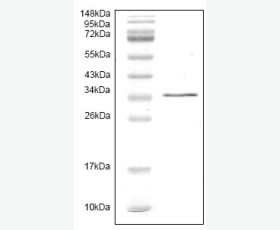Recombinant Human Fibroblast Growth Factor 7/FGF-7/KGF
| Product name: | Recombinant Human Fibroblast Growth Factor 7/FGF-7/KGF |
| Source: | E.coli |
| Purity: | Greater than 95% as determined by reducing SDS-PAGE. |
| Buffer Formulation: | Lyophilized from a 0.2 μm filtered solution of 20mM PB,pH8.0,l50mM NaCl. |
| Applications: | SDS-PAGE, Western Blot (WB), ELISA (EIA), Immunoprecipitation (IP) |
| Storage: | Avoid repeated freeze/thaw cycles. Store at 2-8 degree C for one month. Aliquot and store at -80 degree C for 12 months. |
| UOM: | 100ug/50ug/200ug/1mg/1g |
| Source | E. coli |
| Description | Recombinant Human Fibroblast Growth Factor 7 is produced by our E.coli expression system and the target gene encoding Cys32-Thr194 is expressed. |
| Names | Fibroblast growth factor 7,FGF-7,Heparin-binding growth factor 7,HBGF-7,Keratinocyte growth factor,FGF7,KGF |
| Accession # | P21781 |
| Formulation | Lyophilized from a 0.2 μm filtered solution of 20mM PB,pH8.0,l50mM NaCl. |
| Shipping |
The product is shipped at ambient temperature. |
| Reconstitution |
Always centrifuge tubes before opening. Do not mix by vortex or pipetting. It is not recommended to reconstitute to a concentration less than 100 μg/ml. Dissolve the lyophilized protein in ddH2O. Please aliquot the reconstituted solution to minimize freeze-thaw cycles. |
| Storage |
Lyophilized protein should be stored at < -20°C, though stable at room temperature for 3 weeks. Reconstituted protein solution can be stored at 4-7°C for 2-7 days. Aliquots of reconstituted samples are stable at < -20°C for 3 months. |
| Purity |
Greater than 95% as determined by reducing SDS-PAGE. |
| Endotoxin | Less than 0.1 ng/µg (1 IEU/µg) as determined by LAL test. |
| Amino Acid Sequence |
CNDMTPEQMATNVNCSSPERHTRSYDYMEGGDIRVRRLFCRTQWYLRIDKRGKVKGTQEMKNNYN IMEIRTVAVGIVAIKGVESEFYLAMNKEGKLYAKKECNEDCNFKELILENHYNTYASAKWTHNGG EMFVALNQKGIPVRGKKTKKEQKTAHFLPMAIT
|
| Background | Fibroblast growth factor 7 (FGF7) is a secreted protein which is mainly located in epithelial cells and belongs to the heparin-binding growth factors family. FGF family members possess broad mitogenic and cell survival activities, and are involved in a variety of biological processes, including embryonic development, cell growth, morphogenesis, tissue repair, tumor growth and invasion. FGF7 is a potent epithelial cell-specific growth factor, whose mitogenic activity is predominantly exhibited in keratinocytes but not in fibroblasts and endothelial cells. It is possible major paracrine effector of normal epithelial cell proliferation. |
| References |
Blockage of a miR-21/EGFR regulatory feedback loop augments anti-EGFR therapy in glioblastomas |














